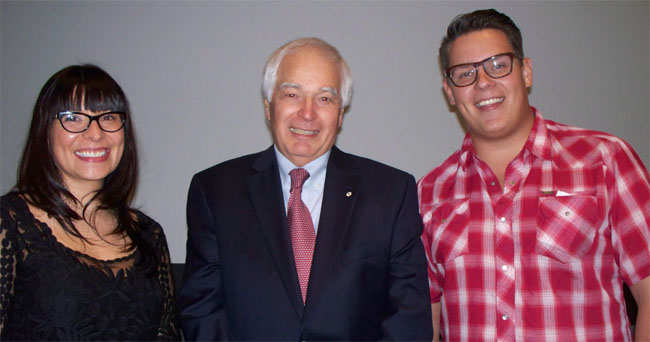An afternoon at the museum with James Bartleman

By Shirley Honyust/ Yenatli:yo
LONDON – Candace Brunnette and Trevor Phillips from Indigenous Services at Western University (formerly U.W.O.) introduced Mr. James Bartleman at London Museum on a sunny Saturday afternoon in October.
Born in Orillia, Bartleman spent his formative years in the Muskoka town of Port Carling. He is a proud member of the Chippewas of Rama (Mnjikaning) First Nation and in 1963 he received his Bachelor of Arts degree in History from the University of Western Ontario. He was also initiated as a member of the Phi Delta Theta (established in 1848, Phi Delta Theta was created under three principal objectives: “the cultivation of friendship among its members, the acquirement individually of a high degree of mental culture, and the attainment personally of a high standard of morality”).
What initially impressed Bartleman politically was a visit in 1990 by Desmond Tutu when he came to Canada to thank the Prime Minister for leading the fight against apartheid, and when Desmond Tutu was invited by the chief of Mishkeegogamang First Nation he couldn’t understand the Canadian’s support for his country while First Nations suicides were creating an epidemic of crisis proportions.
While suicides among First Nations children and youth were prevalent, this caused him to reflect on his own childhood and how lucky he was during those years. Although his dad was steadily employed as a fisherman, it was hard work and he was extremely underpaid. He was sure that didn’t want to do that when he grew up. Living close to a landfill area, he and his brother went there to pick up books on a regular basis and by the time he started school he already knew how to read. As time went on fortune smiled upon him and his future was secured when a rich American supported his education at Western University in London.
After a distinguished career of more than 35 years in the Canadian Foreign Service, now the Department of Foreign Affairs and International Trade, Bartleman was appointed the 27th Lieutenant Governor of Ontario. From the beginning of his role in March 2002 to his final day in September 2007, he took on this position quite seriously. He cultivated public awareness of First Nations issues and worked diligently to attain three goals: to reduce the stigma of mental illness; to fight racism and discrimination and to promote literacy among First Nations children.
He established the Lieutenant Governor’s Book Program in 2004 and since that time over 1.5 million books have been donated from all corners of the province, mainly to First Nations communities in Northern Ontario, beginning with the first designated drop off location being the local Ontario Provincial Police Stations.
To further promote literacy, Mr. Bartleman initiated a program to pair up Native with non-Native schools in Ontario and Nunavut, as well as setting up 25 summer reading camps for literacy development in northern First Nations communities; today those camps number 86 across Canada. Also, The James Bartleman Aboriginal Youth Creative Writing Award, established in 2008, recognizes and rewards up to six Aboriginal youth for their creative writing talent with an award of $2,500.
After talking at length about the books he wrote: Raisin Wine: A Boyhood in a Different Muskoka; As Long as the Rivers Flow; The Redemption of Oscar Wolfe, Bartleman invited questions from the audience. The theme for this lecture was The Aboriginal Canadian as Outsider, which is the basis of his next book, “Exceptional Circumstances”. Questions sprang from both sectors of the audience, Native and non-Native, some in relation to his books, some in relation to his political beliefs, and all in the wake of the shooting at the Parliament Buildings in Ottawa earlier that week. Mr. Bartleman was asked what the most intriguing question of the day was, to which he stated without hesitation, “It was the one about being an Indigenous Canadian and an outsider with the same identity”.


